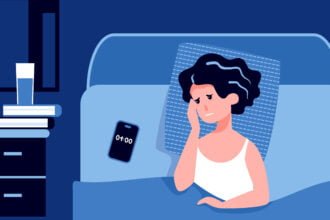Having trouble falling or staying asleep?
Having trouble falling or staying asleep? Insomnia may be an important indicator of future hospitalization among middle-aged and older adults, according to a new study published online in the Journals of Gerontology Series A: Biological Sciences and Medical Sciences. A team led by researchers at the Johns Hopkins Bloomberg School of Public Health examined the association between insomnia and use of home healthcare services, nursing homes, and hospitalization, and found that insomnia symptoms experienced by middle-aged and older adults were associated with greater future use of costly health services.
“In a large representative sample of U.S. middle-aged and older adults, we found that individuals with a greater number of insomnia symptoms were more likely to be hospitalized, and to use home healthcare services,” said Adam Spira, PhD, senior author of the study and an assistant professor with the Bloomberg School’s Department of Mental Health. “Over 40 percent of our sample reported at least one insomnia symptom, consistent with previous studies that showed insomnia to be very common in this population. If the association between insomnia symptoms and health service utilization is causal, our findings would suggest that the prevention of insomnia could decrease health service use by 6 to 14 percent in this population.”
According to the National Institutes of Health, insomnia is the most common sleep complaint at any age and affects almost half of adults ages 60 and older. Insomnia symptoms include difficulty falling asleep, staying asleep, or both, and individuals with insomnia often report getting too little sleep, having poor sleep quality, and not feeling refreshed when they wake up.
Lead author Christopher Kaufmann, MHS, and his colleagues examined the association between insomnia symptoms and reports of health service utilization using data from the Health and Retirement Study. Participants were asked how often they experienced trouble falling asleep, trouble with waking up during the night, trouble with waking up too early and not being able to fall asleep again, and how often they felt rested when they woke up. Researchers evaluated health care utilization in 2006 and respondents were asked questions about their use of several health services two years later, including whether they were hospitalized, used home health care services, or were placed in a nursing home. Participants’ demographic characteristics as well as current or previous medical conditions were also recorded.
“We found that there was a statistically significant relationship between the report of insomnia symptoms and the future use of costly health services,” said Kaufmann, a doctoral student with the Bloomberg School’s Department of Mental Health. “A relationship was even found between insomnia symptoms and hospitalization as well as use of any of the three health services after accounting for common medical conditions and elevated depressive symptoms. These results suggest that treating and carefully monitoring insomnia symptoms in middle-aged and older adults might somewhat reduce the use of health services and presumably the poor health outcomes that necessitate these services.”
I have to sleep on this study. See you tomorrow.










